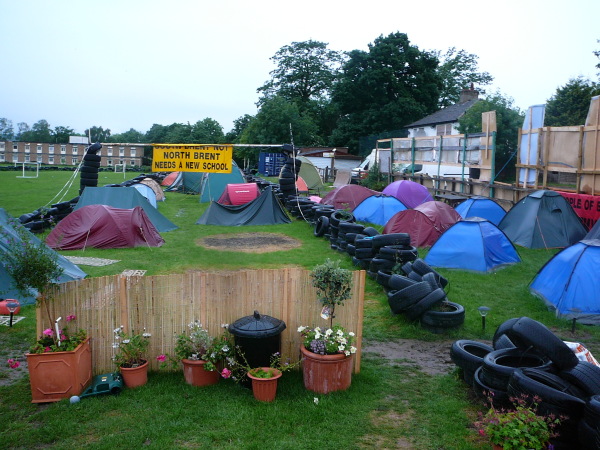
Scenes from Brent occupation
On the 28th April 2008, David Blunkett - the Brightside MP - made a
statement that opposition to plans to turn Parkwood High School
(Burngreave, Sheffield) into an academies school was “led by the
far-left” and accused activists involved in the campaign of using
children at the school “as their political football”.
Ignoring the fact that there are a large number of (understandably)
outraged parents who have been very vocal in their opposition to the
plans; Is it really activists who are playing “political football” with
the future of young people?
The academy schools programme represents an attempt by the state to
solve a long-standing crisis that has existed in the maintenance and
funding of public education. Pressure to improve basic education
facilities and cater to inflated league-tables and test scores has
resulted in a push for privatisation in the sector. The issue, however,
is not so much to do with lack of investment (the amount that sponsors
contribute to academies is negligible given the general cost of upkeep).
Instead, this is a concerted strategy to “re-agent” public services; to
take them out of the state system and into the hands of unaccountable
private investors. The sponsor gains control of the school’s governors,
control over what is taught in the school and crucially also control
over the pay and conditions for staff working there and the admissions
policy of the academy. This absolves the state of responsibility over
the running of the school (most of the time in areas which require the
most investment and development) and permanently removes it from the
sphere of public accountability. It is a political strategy which
removes the government from potential political crossfire concerning
education in “difficult” (read working class) areas. (For a more
extensive analysis of the Academy school reform programme see Organise!
#69 “Building Schools for the Future” -
 http://www.afed.org.uk/org/org69.pdf)
http://www.afed.org.uk/org/org69.pdf) It is clear from the developments at Parkwood High School that these
reforms have absolutely nothing to do with developing a valuable
education for young people’s futures. The proposals by Edutrust represent
an obvious display of class-prejudice. The company plans to strip away
the comprehensive education that existed at the school, despite the fact
that Parkwood is by no means a “failing” school and actually witnessed an
improvement in standards at the last ofsted inspection, and replace it
with vocational training. While vocational training should be valued as
highly as any other form of education (or any other form of work), the
fact of the matter is that as it exists now this programme will severely
limit the options of young people who enter this school. Edutrust will
ensure that the education system in Burngreave will be providing the next
generation of brick layers, builders, mechanics etc. (i.e. skilled manual
labourers) for the city. The idea that working class kids may want to
pursue some other form of education, learn another language, develop
their creativity, even that they may want to have the chance to go to
University, is not a part of Edutrust’s programme.
The time to fight academies is now.
Although methods such as sit-ins, occupations and protests may seem
extreme, they have proved to pay-off in the past. Opposition to
academies has proved successful where the local community have felt
energised by campaigns, where they feel that they are a part of the
struggle and where there is an effort to build a sense of solidarity and
mutual support. It is very easy as a lone parent to feel isolated in
your objections to these proposed “reforms”, both by the school and
local authorities and even amongst other parents, but a highly visible
and active opposition can give a real sense of unity and strength. In
Brent, for example, protestors including teachers, parents and sports
ground users occupied Wembley Park sports field - the proposed site for
the construction of a city academy. This was a massive show of strength
by local people which paid off almost immediately as within a week the
‘sponsor’ Andrew Rosenfield withdrew his support from the proposal.
Obviously, these tactics cannot be used everywhere, actions have to be
tailored to the particular local circumstances and it would be naive to
believe that there is a one-size-fits-all solution to halting the
academies programme. Yet in successful campaigns there have been common
characteristics – educating and mobilising the local community about the
damaging effects of the academy programme, developing strong
relationships between parents and other affected groups such as workers
and teachers at the schools and embracing a diversity of tactics beyond
relying on the tired promises of local councillors and politicians.
As anarchists we believe that the control and maintenance of education
should be placed in the hands of local people. Schools should be run by
and to the needs of the local community. The future of our children is
precious and should not be placed under the control of private businesses
or even state bureaucrats. Academy schools represent a cynical attempt by
the government to dump the responsibility of public education into the
hands of private business. Well the responsibility was never theirs, it’s
ours and it is time to take it back.
Sheffield Anarchist Federation

 e-mail:
e-mail:
 Homepage:
Homepage:

Comments
Display the following comment